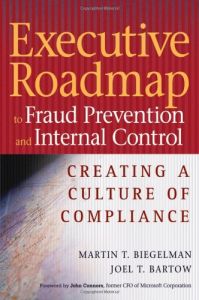Join getAbstract to access the summary!

Join getAbstract to access the summary!
Martin T. Biegelman and Joel T. Bartow
Executive Roadmap to Fraud Prevention and Internal Control
Creating a Culture of Compliance
Wiley, 2006
What's inside?
Comply with Sarbanes-Oxley and improve your bottom line by fighting fraud with robust internal controls.
Recommendation
"A thing worth having is a thing worth cheating for," said W.C. Fields, though the executive fraudsters from Enron, Adelphia and WorldCom who are now languishing in prison might disagree. Two others who disagree are former federal agents Martin Biegelman and Joel Bartow. Now fraud investigators at U.S. companies, the authors have pooled their considerable knowledge in this comprehensive overview of what fraud is, how it occurs and how to prevent it. The book briefly describes everything a busy executive needs to know about antifraud programs. Actually, they provide everything and more, which is the rub. The book is repetitious and disorganized, bogs down in irrelevant legislative history, contains a spotty index and reads like a series of verbose PowerPoint slides. getAbstract recommends this book to those who can look beyond ponderous presentation and need a single-volume overview on stopping the many ruses to which any company is vulnerable. Fraudsters take note: Your days are numbered if CEOs and CFOs take this book to heart.
Summary
About the Authors
Martin T. Biegelman is Director of Financial Integrity at a major international company and was a U.S. Postal Inspector. Joel T. Bartow is Director of Fraud Prevention at a private firm and was a special agent for the U.S. Federal Bureau of Investigation.



















Comment on this summary